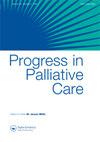评估EAPC马德里宪章关于临终关怀和姑息治疗志愿服务:对影响的思考
IF 0.9
Q4 PUBLIC, ENVIRONMENTAL & OCCUPATIONAL HEALTH
引用次数: 1
摘要
欧洲临终关怀协会(EAPC)关于临终关怀和姑息治疗(HPC)志愿服务的马德里宪章于2017年启动,旨在倡导支持、认可、促进和发展临终关怀和姑息治疗志愿服务。然而,很少对宪章进行评估,其影响往往是先验的。为了评估这些声明是否会影响变化,我们必须了解它们的范围和用途。我们旨在评估EAPC马德里宪章对欧洲HPC志愿服务的认识、覆盖面和影响,并评估其作为HPC宣传工具的潜力。一份包括开放式和封闭式问题的在线调查问卷被发送给所有55个EAPC成员组织、其他地区和国家的欧洲HPC和HPC志愿者组织。收到了来自11个国家的46份答复。《宪章》主要通过口头传播(72%)。64%的答复者听说过《宪章》;其中80%的人签署了协议,但只有30%的人使用了协议。董事在政策文件中使用《章程》(70%)。志愿者协调员以各种方式使用它(57%)。大多数一般协调员(83%)认为《宪章》没有用处。与会者的反馈意见显示,缺乏实际应用。《宪章》被认为对政策谈判有用,但在短期内缺乏支持高性能计算志愿工作的实际应用。章程可能是长期变革的工具,而不是实践中的即时变革。在以实际文书补充《宪章》的情况下,可能需要采取多管齐下的办法。本文章由计算机程序翻译,如有差异,请以英文原文为准。
Evaluating the EAPC Madrid Charter on volunteering in hospice and palliative care: Reflections on impact
The European Association for Palliative Care (EAPC) Madrid Charter on volunteering in hospice and palliative care (HPC) was launched in 2017 to advocate for the support, recognition, promotion and development of volunteering in HPC. However, charters are rarely evaluated, and impact often assumed a priori. To evaluate whether such declarations influence change, we must understand their reach and use. We aimed to assess the awareness, reach and impact of the EAPC Madrid Charter on HPC Volunteering in Europe and evaluate its potential as an advocacy tool in HPC. An online survey questionnaire including open and closed questions, was sent to a convenience sample of all 55 EAPC member organizations, other regional and national European HPC and HPC volunteering organizations. Forty-six responses were received from 11 countries. The Charter mainly spread through word of mouth (72%). Sixty-four per cent of respondents had heard of the Charter; of these 80% had signed it but only 30% had used it. Directors used the Charter in policy documents (70%). Volunteer coordinators had used it in various ways (57%). Most general coordinators (83%) found no use for the Charter. Feedback from participants indicated a lack of practical applications. The Charter was considered useful for policy negotiation but lacking practical applications to support HPC volunteering in the short term. Charters may be tools for long-term change, rather than immediate change in practice. A multipronged approach may be required where Charters are complemented by practical instruments.
求助全文
通过发布文献求助,成功后即可免费获取论文全文。
去求助
来源期刊

PROGRESS IN PALLIATIVE CARE
PUBLIC, ENVIRONMENTAL & OCCUPATIONAL HEALTH-
CiteScore
2.60
自引率
11.80%
发文量
24
期刊介绍:
Progress in Palliative Care is a peer reviewed, multidisciplinary journal with an international perspective. It provides a central point of reference for all members of the palliative care community: medical consultants, nurses, hospital support teams, home care teams, hospice directors and administrators, pain centre staff, social workers, chaplains, counsellors, information staff, paramedical staff and self-help groups. The emphasis of the journal is on the rapid exchange of information amongst those working in palliative care. Progress in Palliative Care embraces all aspects of the management of the problems of end-stage disease.
 求助内容:
求助内容: 应助结果提醒方式:
应助结果提醒方式:


